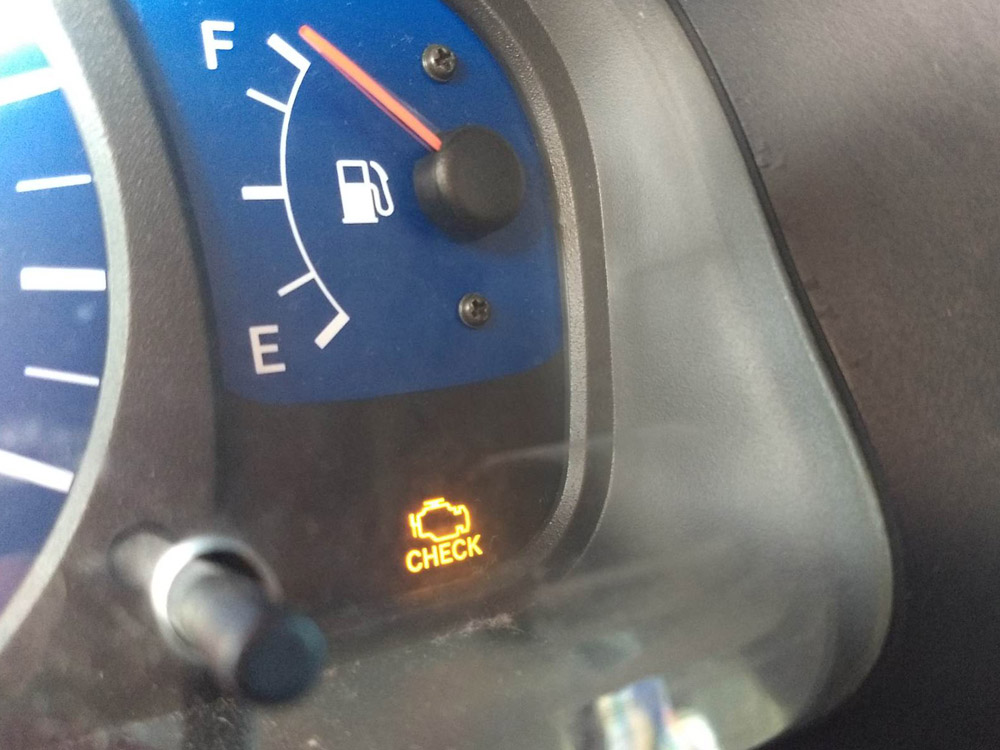“Check Engine” Light Diagnosis: What’s Your Best Option?

Regardless of whether it impacts vehicle drivability, an illuminated “check engine” light isn’t something you should ignore. Photo: American Ratings Corporation ©2019
Few things are more disconcerting than when the “check engine” light illuminates on your car’s dashboard. What’s most alarming isn’t the light itself but the ambiguity it presents. Since the “check engine” light can be triggered by a wide range of factors, you don’t know if you’re dealing with something insignificant (a loose gas cap) or something serious (a catalytic converter failure), which can produce a sense of anxiety every time you drive.
Regardless of how you feel about it, an illuminated “check engine” light isn’t something you should ignore (although many people do just that). Even if the issue doesn’t seem to be impacting your vehicle’s drivability, it could be getting worse with time, which could lead to an expensive failure down the road. Furthermore, as you’re likely aware, a vehicle can’t pass its smog test if its “check engine” light is illuminated, regardless of the reason. Because of this, it’s best to get a diagnosis sooner than later.
When it comes to getting a “check engine” light diagnosis, you have a few options:
- An auto repair or parts supply chain
- Do-it-yourself
- An independent auto repair shop
Which of these options is the best? To find out, we’ll need to look at each in greater detail.
Auto repair/parts supply chain
Most auto repair and parts supply chains offer complimentary “check engine” light diagnostic tests. The test is performed using a scanner that reads the diagnostic code stored in the car’s computer memory. Each code is associated with a specific issue, whether a failed sensor, a bad spark plug wire or a vacuum leak. After obtaining the code, the shop representative will typically offer a repair service or replacement part to remedy the issue.
The problem with this option is that diagnoses based on scan codes aren’t always conclusive. Far from being a basis for prescribing repairs, this measure should be the first step in a more in-depth diagnostic process, which few chain stores possess the equipment or expertise to perform. It’s also worth noting that these stores don’t offer this complimentary service out of pure benevolence—it’s primarily a sales tool. This isn’t to say auto chains are out to deceive people; in all likelihood, they genuinely want to solve their customers’ problems. However, by failing to exercise due diligence with diagnostics, they’re just as likely to waste their money.
Do-it-yourself
Another popular option for diagnosing a “check engine” light is to go the DIY route. Basic code scanners can be purchased for under $50, which is less than what most independent auto repair shops charge for a diagnostic service. After using the scanner to obtain the diagnostic code, a vehicle owner can perform an internet search to determine the likely cause and learn how to remedy the issue.
While there’s nothing wrong with performing your own diagnostic scan, the problem, again, is that scan codes don’t always offer a conclusive diagnosis. They can get you in the ballpark, but they may not be a sound basis for making major repairs. Unless you have strong expertise in the automotive field, you’ll want to get some professional insight.
Independent repair shop
A third option is having your “check engine” light diagnosed by an independent auto repair shop. This could be a general mechanic or a shop that specializes in certain makes or types of vehicles (for example, a European auto repair specialist).
There are a couple of things that distinguish an independent repair shop from an auto repair or parts supply chain. First is the sophistication of its equipment. Whereas chains often prescribe repairs based off of basic code scans, independent shops use manufacturer-specific tools and other high-end equipment to pinpoint the specific underlying cause. Additionally, independent professionals tend to have a more in-depth diagnostic process due to their extensive level of expertise. As a result, you can expect to get a more accurate diagnosis, which will give you more confidence about spending money on repairs.
Of course, not just any independent auto repair shop will do. There are a lot of shops out there, and not all possess the same degree of expertise, equipment or work ethic. That’s why your best bet is to take your vehicle to a Diamond Certified auto repair shop.
Use Diamond Certified Resource to find top rated companies.
Local, Top Rated Diamond Certified Companies Related to Your Topic
Marin County Auto Repair Shops
San Francisco Auto Repair Shops
Alameda County Auto Repair Shops
San Mateo County Auto Repair Shops
Santa Clara County Auto Repair Shops
Related Articles
The Essential Guide to Car Repairs and Maintenance
Get Expert Advice From Owners of Top Rated Local Companies
Become a Diamond Certified Preferred Member (Always Free)